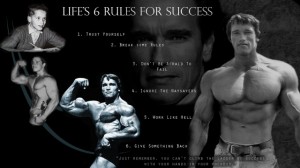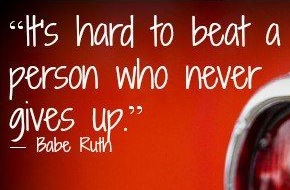 Contrary to what my headline might suggest, this is actually an upbeat message.
Contrary to what my headline might suggest, this is actually an upbeat message.
Guilt is about what you have done. You did something you feel you should not have done, but you did it anyway. Out of spite, out of impulsivity, out of ignorance. Now you are suffering. You feel bad about it.
Shame is about who you are. You are, in your world, less than you should be. That should may come from religion, comparison with others, comparison with the potential you once were…. Either way, you disappointed yourself, and now you are suffering.
Failure in business/life has no connection to either of these.
Failures, in business/life, are those little solar lights stuck in the ground, on the way to success. People who got successful too fast, without having a path marked by failures, don’t know what they did right, and also don’t know what are the wrongs they could have done. They are clueless and therefore will not be able to stay on the top, successful, and once slid down, won’t be able to get back, because they didn’t learn any lessons… they will have to start from the beginning with a handicap.
People who got successful too fast, without having a path marked by failures, don’t know what they did right, and also don’t know what are the wrongs they could have done. They are clueless and therefore will not be able to stay on the top, successful, and once slid down, won’t be able to get back, because they didn’t learn any lessons… they will have to start from the beginning with a handicap.
Success makes you handicapped. Un-earned success.
This is in every area of life, business, relationships, and even in the area of spirituality.
One of the things that is missing for most of my readers is to be people of action. You live in your head, and in the two-dimensional mind (right/wrong) failure of any kind is the enemy. I want you to become the kind of person who takes actions, stays awake, stays aware, and does, what I would call with Landmark Education’s words: “powerful debriefing.”
When you can do powerful debriefing, you learn more in a conversation than most people learn during 4 years of study for an MBA. You become the kind of person where you can say: “Failure does not frighten me.”
 One of the most effective sales pitches I have ever heard was a guy asking me how much money would I stand to lose if I didn’t take action in the direction of my dreams… he was offering a coaching program, by the way.
One of the most effective sales pitches I have ever heard was a guy asking me how much money would I stand to lose if I didn’t take action in the direction of my dreams… he was offering a coaching program, by the way.
So the question wasn’t whether I can win or not. It wasn’t whether I could make money with my idea. It was: if with his help I could do what I planned on doing, as fast as I planned on doing it: at the end of the year, if I didn’t even go for it, how much money, satisfaction, success, fulfillment, self-esteem would I be less.
This is a dramatic question.
In my current business: if I could double my sales volume on Amazon every month, by later this year I would be able to buy a house, or move to Europe, or… I don’t even talk about lesser goodies… these have been utterly impossible for me.
Will I be able to do it? Who knows. If I don’t share my results, maybe. If I do, because of the Evil Eye, probably won’t be able to double it even once.
Two weeks ago I shared some success: Evil Eye has brought me back to level zero with an additional one grand in the hole… pretty, eh?
Those of you that think sharing your successes is a good idea, cut it out. Instead, keep your attention on the things that need improvement, and you’ll save yourself from Evil Eye, and tweak your way to actual success.
 Failure, big or small, partial or total, it seems, is immensely valuable and important and necessary to your success.
Failure, big or small, partial or total, it seems, is immensely valuable and important and necessary to your success.
Here’s how to use this principle to take you to the top:
- Fail cheaply. Always ask, “What is the minimum viable experiment?” Which will put your attention on what tests, failures you can plan for, what small steps would make it clearer which direction success lies.There is a game. I know it is also played by some people in America, we used to play it all the time in Hungary. It can be played with two players or many.A person or a group decide whether their item will be a person, an object, or a historical event. Some play it only with “famous” persons… but that is not the point here. The point is how it is played.The one person who doesn’t know what the item is, will find out what it is/who it is through asking questions that can be answered with a simple yes or no.
Example: Item: President Obama
Question 1: person? yes
Question 2: contemporary? yes
Question 3: actor? no
Question 4: writer? no
Question 5: politician? yes
Question 6: actively in a leading position? yes
…you see how this goes, so I won’t waste your time.
It sharpens your ability to ask question, but it also teaches you to find your way through lots of “no” answers. All those “no”s are failures… lol… you didn’t think that way, did you?
- Fail forward. Be sure to learn something you didn’t know before you failed. This is where powerful debriefing comes to play. It is powerful, because you take 100% responsibility for the failure… Example: I shared about my success. I got hit by Evil Eye. I could no complain, but instead I look at what I did to activate that… i.e. I took responsibility and I learned a lesson.
- Fail quickly. The primary goal is to prove or disprove your concept. If you spend too much time perturbed, doing the “right thing” you will make it too complicated. Make it as simple as the questions in the game above.
This education by experience can be expensive. But ignorance is even more expensive.
 You can’t get rid of ignorance by reading lots of books and listening to lots of speakers. That kind of learning is learning just in case… I have been advocating just in time learning, and there is no more “just in time” learning than taking an action and finding out if there was something you didn’t know and then you can make quick adjustment, quick correction: you learned something useful.
You can’t get rid of ignorance by reading lots of books and listening to lots of speakers. That kind of learning is learning just in case… I have been advocating just in time learning, and there is no more “just in time” learning than taking an action and finding out if there was something you didn’t know and then you can make quick adjustment, quick correction: you learned something useful.
All the stuff that is in your head is 99% useless, because you don’t need it. And the stuff you need can’t be found out without risking something.
The difference between a languishing human and an Expanding Human Being is that: the Expanding Human Being only learns through doing… through expanding, through failing, making mistakes, and growing in the process.
Now, admittedly, the world isn’t in favor of you doing that, but who said you need to look for permission from the world… look within and find the strengths.
My remedies will help you do that.

Most of my crap goes away when I stop thinking. Well, a bunch. As an artist I ought to remember to work it out in the studio. Work first, edit later, keep what works.